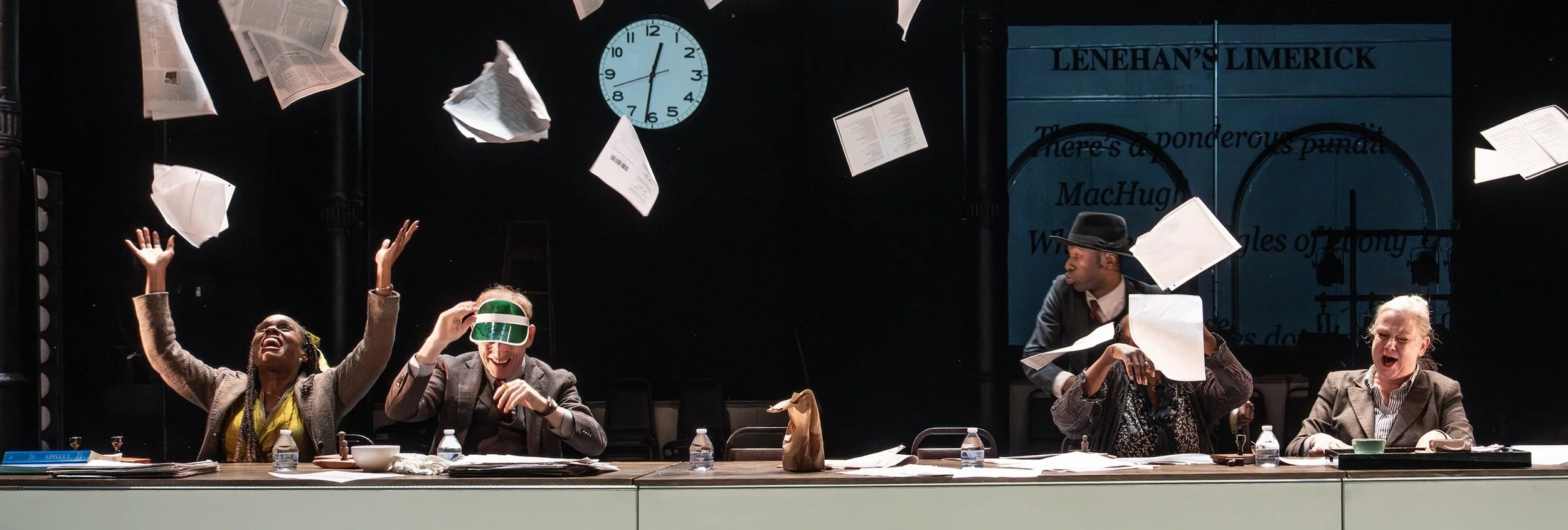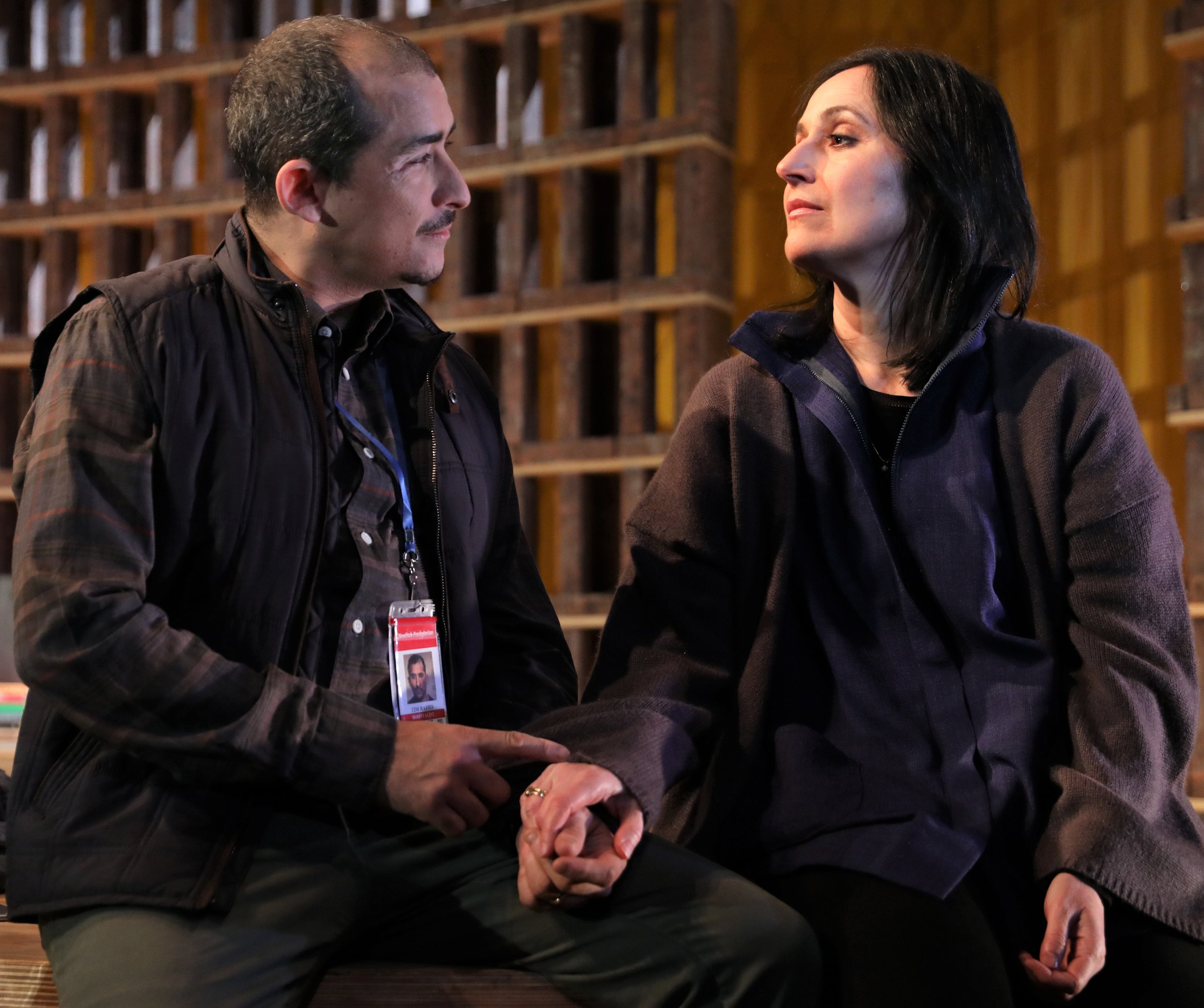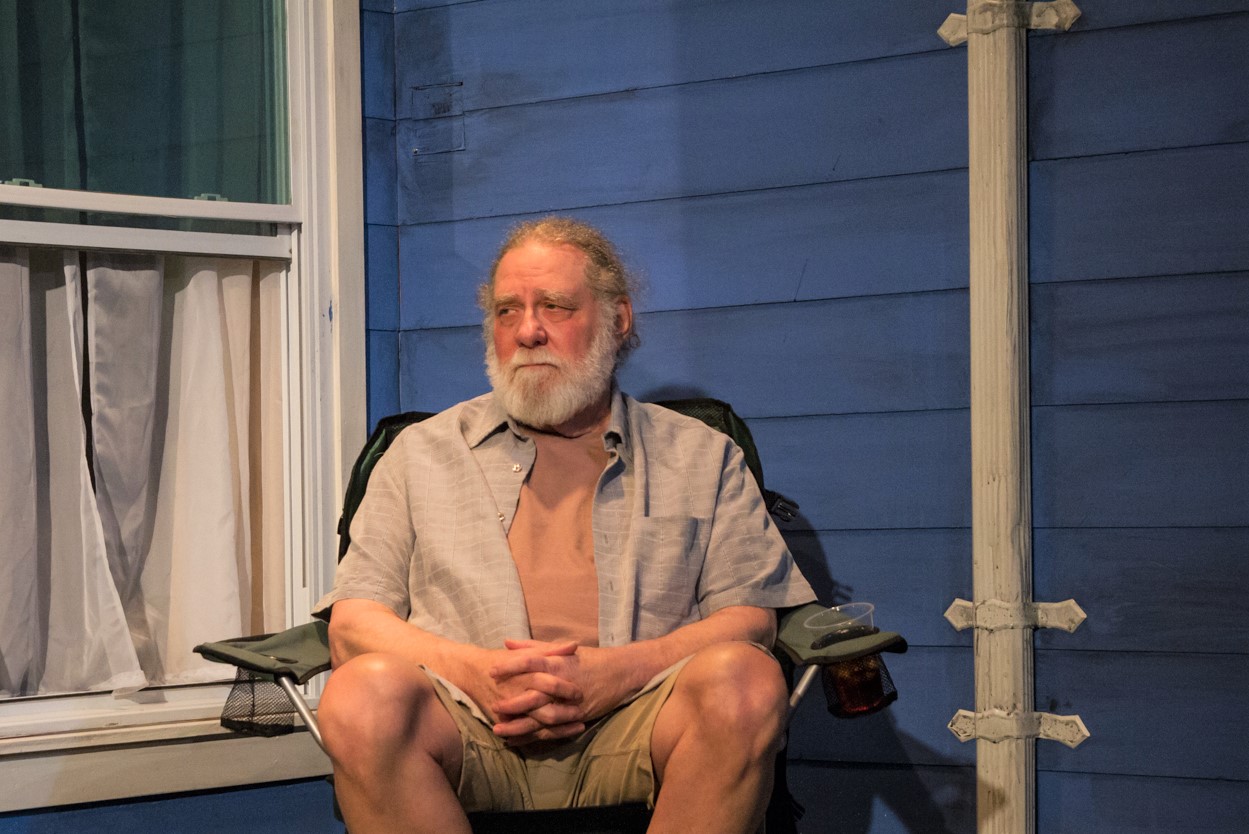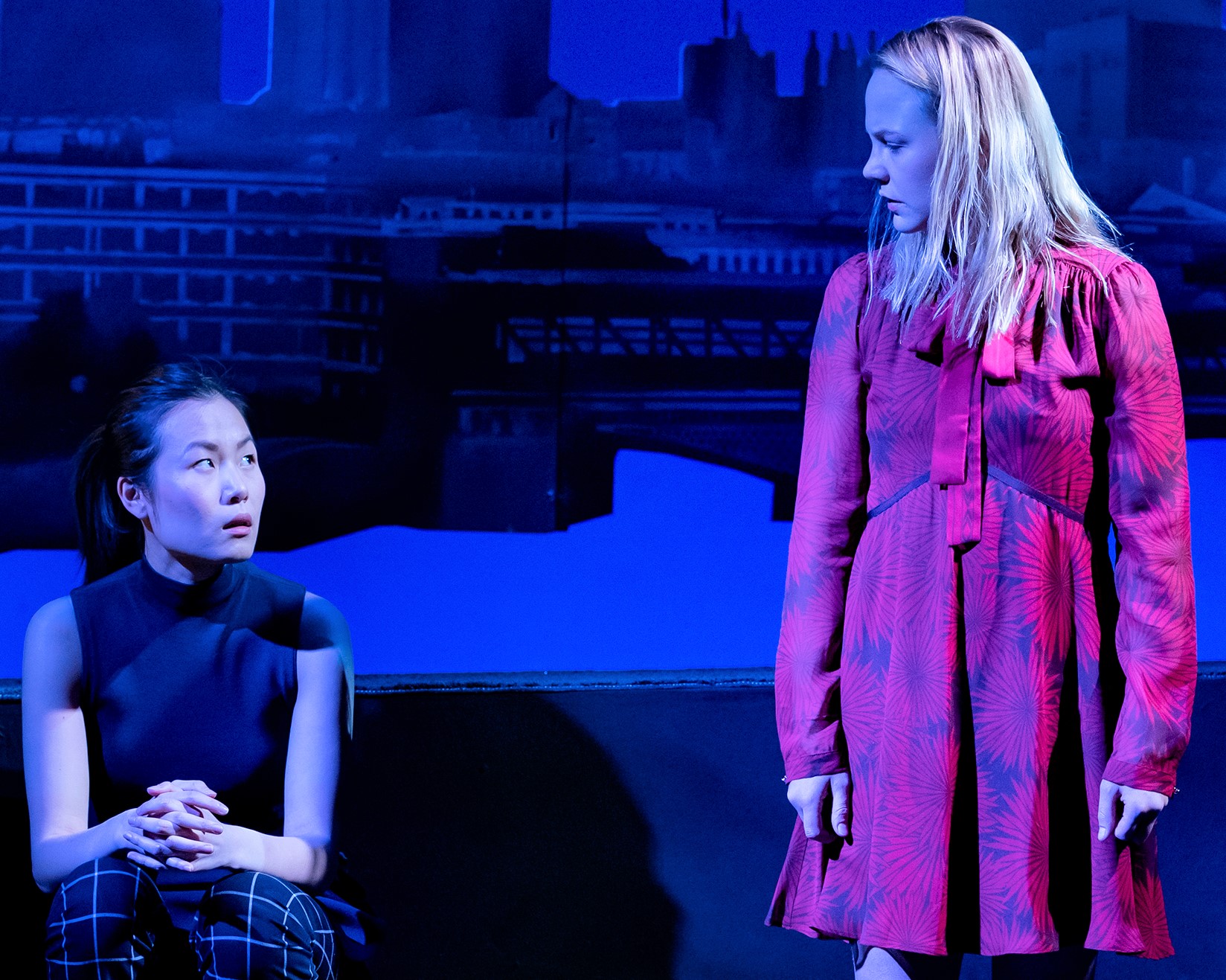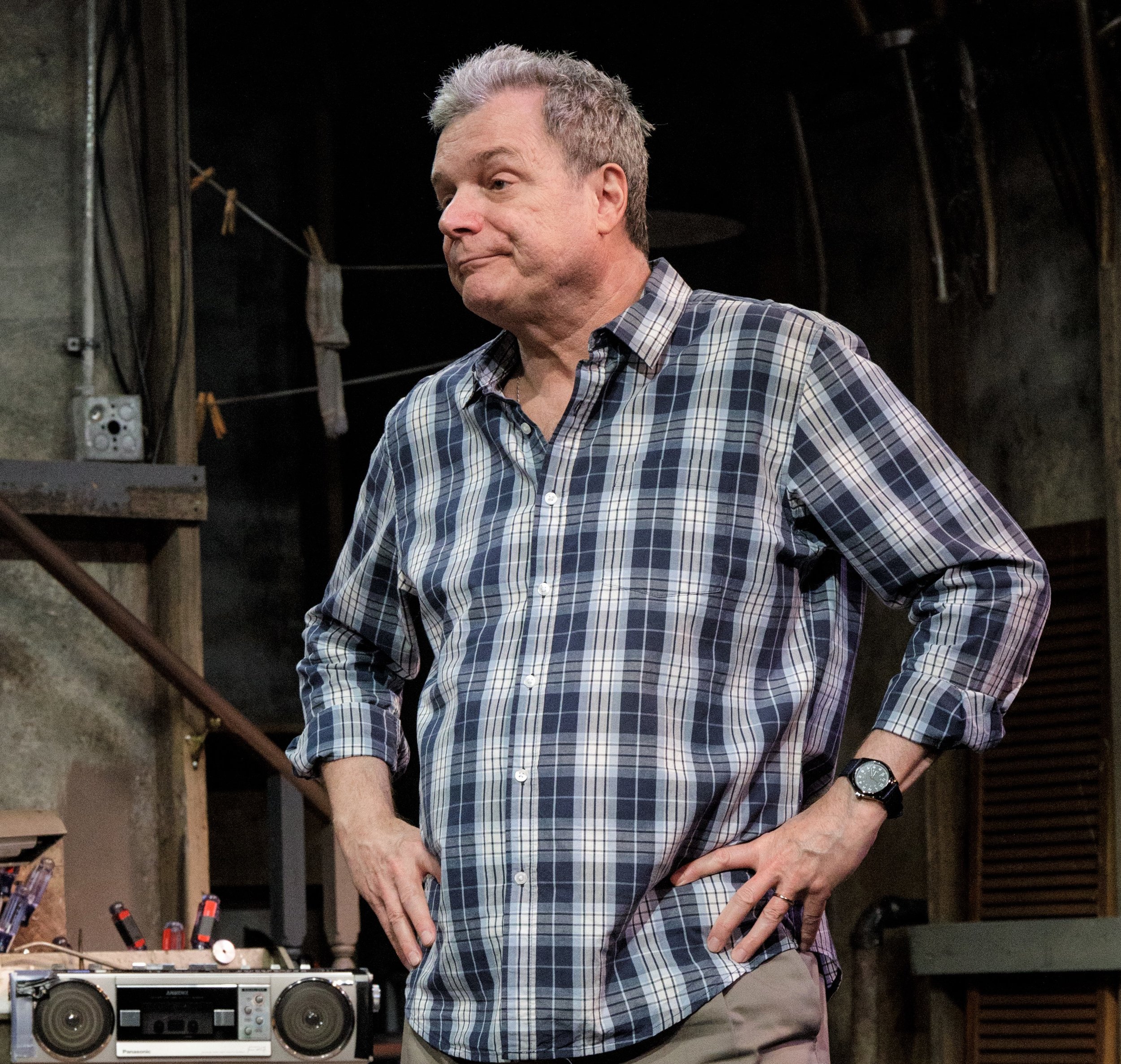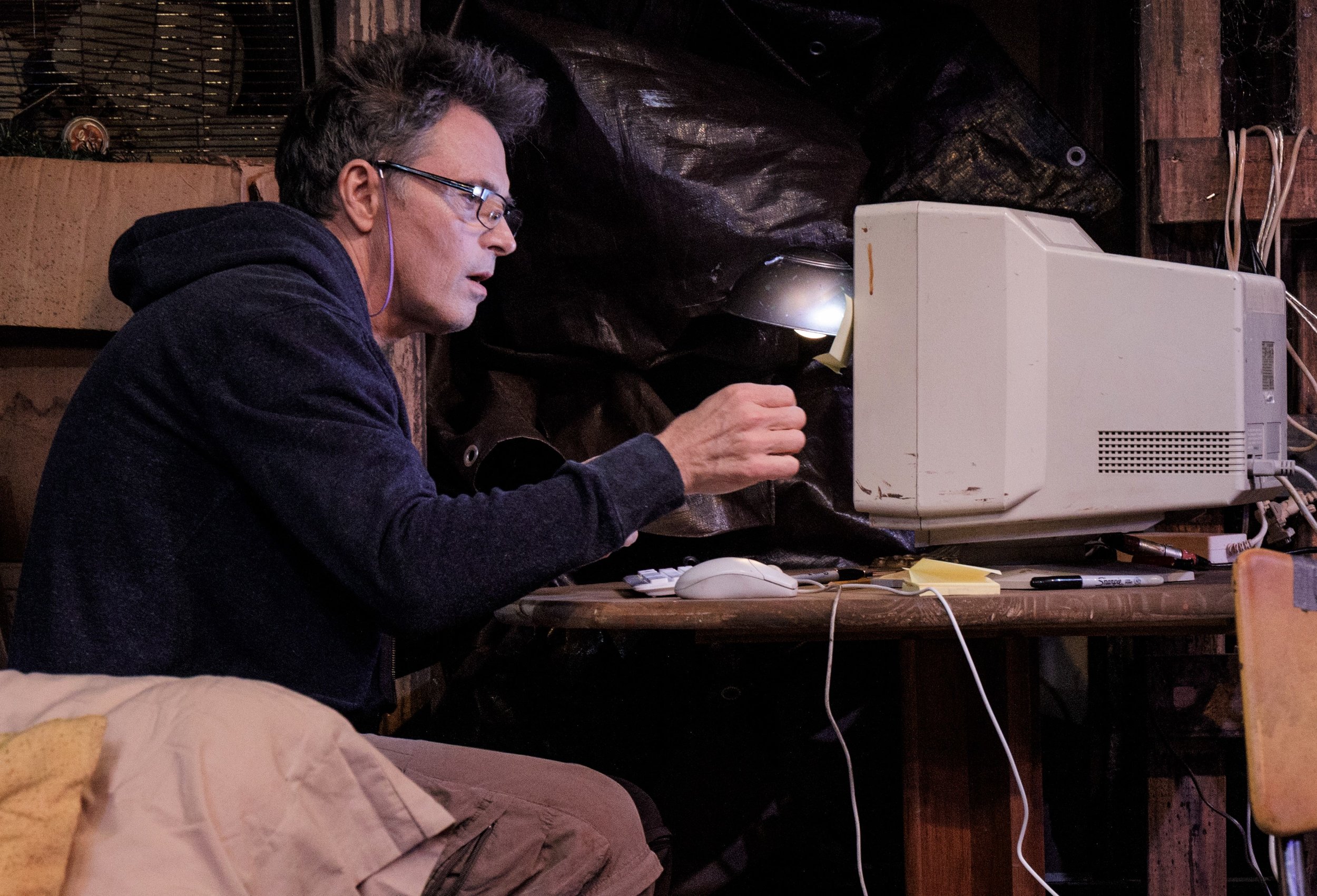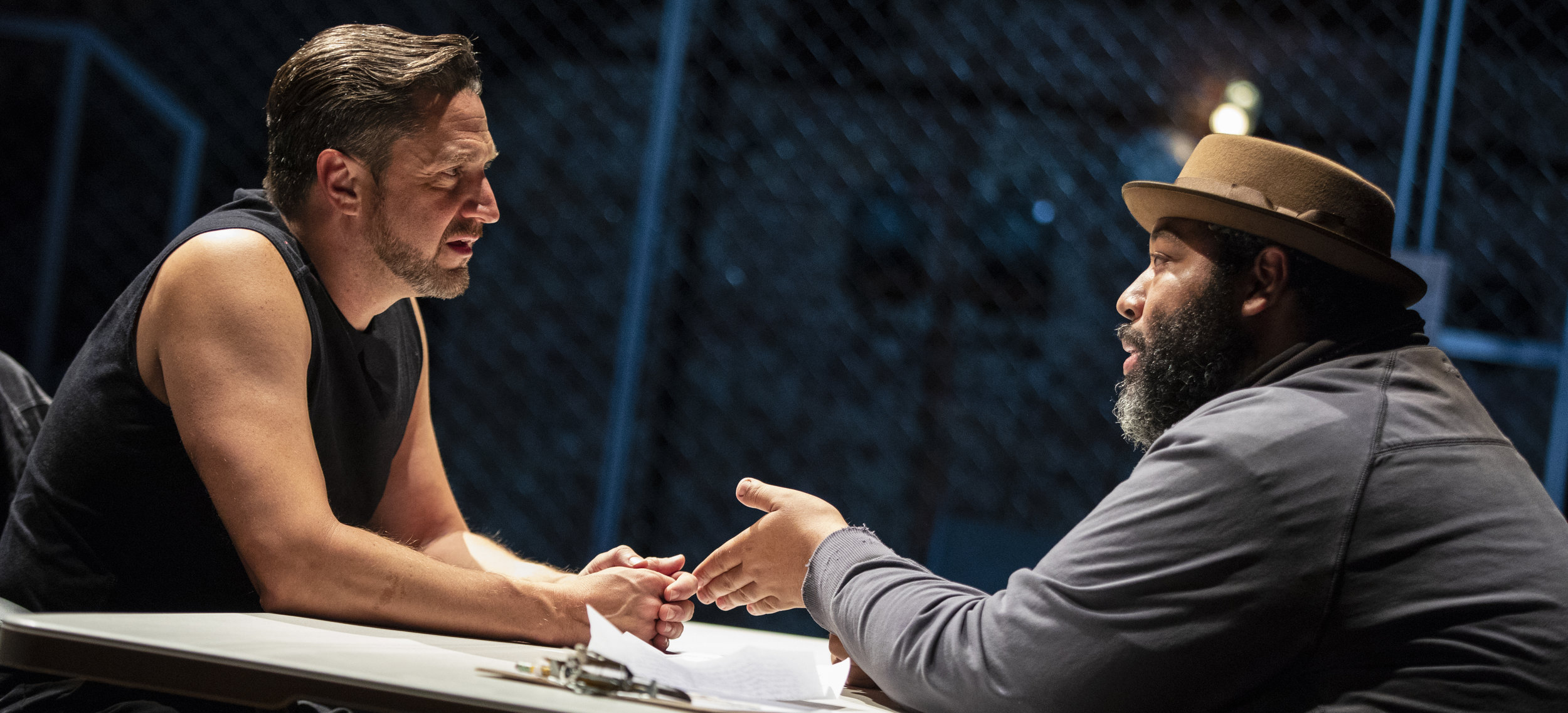Unlike, say, a film such as Oliver Stone’s Wall Street, Clueless has the rare good fortune of clearly representing its historical moment without coming off as a creaky relic. Writer/director Amy Heckerling set her 1995 film in a sort of alternate reality, where the fabulously rich teens of Beverly Hills (already its own parallel universe) reference Kenny G and Christian Slater while dropping hyper-intelligent aperçus disguised as Valley Girl slang. Light on its feet and funny as hell, Clueless was in the ’90s but not of the ’90s.
Christmas in Hell
Like the despised fruitcake that is passed from one generation to the next in Gary Apple’s hard-to-digest musical, Christmas in Hell, the show itself is an amalgam of strange ingredients. Sometimes sincere, usually madcap, but hardly ever having to do with Christmas, it is the tale of an 8-year-old boy mistakenly sent to Hades and the father who has to drink some Clamato to get him back. With one song that rhymes “Jesus” with “Chuck E. Cheese’s,” and another composed almost entirely of variations of the F-word, some in the audience may find the show in bad taste. With references to Charles Manson and Leona Helmsley, others may simply find it stale.
Say Something Bunny!
Old photographs, dusty VHS tapes, and newspaper clippings: though these objects might seem like mundane clutter, there is some truth to the old adage that “one man’s trash is another man’s treasure.” Indeed, there is a distinct thrill that accompanies the discovery of a particularly poignant piece of nostalgia, and it is this curious excitement upon which Say Something Bunny!, an innovative piece of theater by Alison S.M. Kobayashi and UnionDocs, thrives.
Noura
Heather Raffo’s Noura scrutinizes the issue of assimilation of refugees into American society by looking at the experience of the title character, an Iraqi woman. Noura (played by Raffo herself) is a stern but loving mother and wife who escaped the ISIS capture of Mosul with her husband, Tareq (Nabil Elouahabi). After setting down roots in the new country, Noura finds that she desperately misses her hometown traditions. Raffo’s play echoes a question that Arthur Miller, in his essay The Family in the Modern Drama, asks: “How may a man make of an outside world a home?” For Raffo, the question is: “What keeps a family together?” The play reveals ways that American life can create isolation more than togetherness.
Liam Campora (left) plays Yazen, or Alex, and Matthew David is Rafa’a, a family friend, in Heather Raffo’s Noura. Top: Raffo as Noura, with Nabil Elouahabi as her husband, Tareq.
Noura, one of the Christian minority in Mosul, holds on to the Christmas traditions she was raised with as the only things left from the rubble of her hometown. She remembers the way her old neighbors would visit her father’s house on Christmas for a jubilee of dancing, good food and conversation. But in America the fast-paced and alienating effects of social media and personal technologies, such as cell phones and gaming systems, have made it harder for her family to hold on to those traditions.
Her son, whom she calls Yazen but who is also known by an Americanized name, Alex (Liam Campora), is just interested in his PlayStation and hates the fast his family observes. He begs to live a normal American life. Tareq, meanwhile, has come to terms with his new life. He is no longer able to be a surgeon as he once was in Mosul; he now works at a sandwich shop and takes up shifts that cut into his spending time with the family. Noura is thinking of continuing her career as an architect and struggles with how small and uncommunal her family has become. Noura, directed by Joanna Settle, shows that retaining one’s true identity in a new country is a struggle filled with compromises.
There’s also the family’s close friend, Rafa’a (Matthew David) and Maryam (Dahlia Azama), an orphan from Mosul who is sponsored by Noura and Tareq. Rafa’a serves as an interesting sounding board to Noura’s concerns about the life in Mosul, as well as Tareq’s sacrificing of his career and whether or not they have made the right choices in the years they have lived in America. Maryam, who comes for the holidays before going back to Stanford, carries a secret that causes Noura to question holding on to the traditions. She feels pressure to reveal the secrets she carried overseas to New York. The shorthand question in Raffo’s play is summed up by one that Rafa’a asks: Is holding on the old ways necessary?
Raffo and Elouahabi with Dahlia Azama (left) as Maryam. Photographs by Joan Marcus.
The set, designed by Andrew Lieberman, is grounded by a Christmas tree. Lighting designer Masha Tiriming’s lights gently swirl around the tree and glisten like stars in the darkness. It is a constant reminder of the holiday spirit: a time of togetherness and cheer, but it all looms over Noura’s family, who have splintered off from the traditions of her youth in Mosul. In the middle area is a tall structure that looks like a curved cage that encapsulates the family’s coming-together space; books, teapot, and other ornaments lie on the shelf attached to the structure. The table serves as a dinner table and a work station for Noura and is always cluttered. The floor and wall in Lieberman’s set are tiled with an Aramaic design that evokes the idea of the life that was left behind and the life that they are forced to embraced within their home.
But they also recognize the drawbacks of their old life. The communal life that Noura yearns for is mostly out of the sadness of the past she has left behind. Mosul also has a rugged individualism where there are Christian communities and Muslim communities that have strict rules of when mingling amongst each other. Middle Eastern culture prides itself on “deeply interwoven social fabric of community,” Raffo states in the program, while American culture “prides itself on rugged individualism.”
The actors embody the conflicts with intensity, their characters all fighting to have their perspectives heard. “What’s wrong with feeling safe?” says Tareq. “I’m grateful that there is a place we can reinvent ourselves, a place we can forget.” Noura responds, “I don’t want to forget! I’m trying desperately to remember who the hell I am.” There aren’t any clear answers in how to live their lives as true Iraqi-Americans, and no one gains leverage over another’s opinion.
What Noura does successfully is explore the challenges of living free and happy as an immigrant in America from many angles, as the characters express the various ways identity and culture can fulfill one’s sense of being—but it also shows how malleable traditions may become in the need for survival.
Slave Play
Jeremy O. Harris makes an impressive splash with Slave Play, a fascinating, often hilarious, sometimes bumpy, and ultimately serious look at sex and power in modern interracial relationships. The New York Theatre Workshop production also whets one’s appetite for Daddy, a second play of Harris’s that will be seen in the spring at the Vineyard Theatre.
The Net Will Appear
Bernard and Rory, the only characters in Erin Mallon’s The Net Will Appear, are next-door neighbors in Toledo, Ohio. Bernard is a curmudgeonly 75-year-old with a penchant for bird-watching. Rory, age 9, is a wiseacre whose chatter is laced with malapropisms and bawdy phrases she doesn’t understand fully.
Eve Johnson as Rory in Erin Mallon’s The Net Will Appear at 59E59 Theaters. Top: Richard Masur as Bernard. Photographs by Jody Christopherson.
The play opens with the characters’ first encounter—contentious and funny, with a promise of dramatic fireworks to follow. The two are on adjacent roofs, seeking sanctuary from family life. Bernard (Richard Masur) craves solitude; Rory (Eve Johnson), who’s never inclined to silence, tries repeatedly to engage Bernard with her juvenile brand of badinage.
Bernard is an Episcopalian with a drinking problem. He’s polite, though sometimes impatient; and he keeps his own counsel. Rory is a Jewish student at a Roman Catholic grade school. Her conversation is unfiltered. “Everyone thinks you’re a psycho,” she informs Bernard. The odds appear slim that these dissimilar souls can find common ground. In situation comedies of this ilk, though, strange bedfellows inevitably end up best friends.
Before the first scene is over, it’s evident that under its veneer of comic palaver, The Net Will Appear is a melancholy study of youth and age. “I don’t have much past and you don’t have much future,” Rory informs Bernard with a child’s unwitting cruelty. As the action progresses through the seasons of a year, Mallon introduces themes of social importance—most notably, the kinds of anguish suffered nowadays by the youngest and the oldest in American society.
Rory—a child of divorce who seldom sees her father—feels uncertain and out of place in the household her mother has established with a new husband. Rory’s mother is suffering from postpartum depression; the stepfather is egotistical; and a new half-sister is usurping all the affection the family can muster.
Bernard is principal caregiver for his wife, Irma (one of the play’s several offstage characters). Irma’s personality is being leached away by dementia; and Bernard grieves for the loss of his adored companion while attending to the remnant of her that hasn’t been extinguished by Alzheimer’s disease.
Mallon’s script is efficiently constructed and poignant, but there’s little verisimilitude here. The dramatic situation is contrived; the characters are fabricated rather than observed; and the dialogue rises only intermittently above the glossy superficiality of 1980s television comedy. According to formula, the play’s strange bedfellows come to appreciate, even love, each other. Rory’s innocence awakens Bernard’s paternal instincts and, under his tutelage, she becomes sensitive to the wonders around them. “First robin sighting of the season,” he says. “Look at that beautiful red breast.” (Rory, who thinks “breast” is a dirty word, is mightily titillated by that remark.)
Masur in the monologue that is the emotional high point of The Net Will Appear.
While Rory’s guilelessness ultimately endears her to Bernard, the play’s spectators are likely to respond with varying degrees of tolerance for the cute-as-pie dialogue Mallon has concocted for the little girl. The topical references that punctuate Rory’s comic patter are particularly irksome. Take, for instance, the wacky names she gives her possessions: a favorite doll is called Netflix, her cat is Dr. Phil, and the bathtub is “Harriet Tubman.” Like so much else in The Net Will Appear, these jokes, with their transitory shelf life, are disposable.
What’s most satisfying about this production is Masur’s distinguished performance. Renowned for character roles on Broadway, in movies, and on television, Masur makes Bernard’s grief-stricken monologue about his wife’s vanishing personality the most authentic and memorable sequence of the play. Undeterred by W.C. Fields’ warning that actors should “never work with children or animals,” Masur gives a touching performance, enhanced by evident empathy with his younger co-star but never upstaged by her undeniable (for want of a better word) cuteness.
The Net Will Appear takes place entirely on the rooftops of the two houses. Scenic designer Matthew J. Fick has supplied a realistic, eye-appealing set, with the roofs separated by a space at center stage that’s supposed to be too wide for either character to jump across safely. Each actor is confined to his or her roof throughout the 80 minutes of the performance. That spatial separation is a tough assignment for players who’re supposed to depict affection that escalates scene by scene. Mark Cirnigliaro’s capable direction minimizes the awkwardness of all that distance, but direction can’t transform counterfeit dialogue into dramatic gold. What saves the day is Masur’s virtuosity, which redeems a predictable comedy-drama and makes the joyous final scene soar like one of Bernard’s beloved songbirds.
The Net Will Appear runs through Dec. 30 at 59E59 Theaters (59 E. 59th St., between Park and Madison). Evening performances are at 7:15 p.m. Tuesdays to Saturdays; matinees are at 2:15 p.m. Saturdays and Sundays. For information and tickets, call (646) 892-7999 or visit 59e59.org.
The Hard Problem
Fans of Tom Stoppard who are used to the fizzy humor of Travesties, Rosencrantz and Guildenstern Are Dead, or Arcadia should be cautioned that The Hard Problem finds him in his other mode, tackling serious issues with less levity, as he did in The Coast of Utopia and The Real Thing. This time around the paramount concern is the title phrase used by scientists: how does consciousness come about? Connected to it are notions of altruism vs. egoism, with doses of coincidence, conscience, evolution, divinity, business ethics and other meaty subjects thrown in. And yet there are still moments of humor in Jack O’Brien’s fascinating production of this twisty play—a brainiac’s sumptuous meal laid out for the layman.
The playwright begins with an amusing bit of misdirection, as a man and woman debate what appears to be her plea in a case of jewel theft that she is involved in. Soon, though, it’s apparent that they’re engaging in game theory, specifically, the Prisoner’s Dilemma. The woman, Hilary (Adelaide Clemens), is trying to decide the best way to proceed. Her companion, Spike (Chris O’Shea), is her tutor, and he is trying to instill in her the necessity of admitting nothing, a survival strategy that will be familiar to anyone who has watched a police show on TV. “Two rational prisoners will betray each other even though they know they would have done better to trust each other,” he explains. The exercise is to prepare Hilary for a job interview at the Krohl Institute, which studies brain science.
Karoline Xu (left) is Bo and Adelaide Clemens is Hilary in Tom Stoppard’s The Hard Problem. Top: Clemens with Chris O’Shea as Spike.
In Hilary, Stoppard has, unusually for him, written a fascinating female character who carries the story. Clemens invests her with anguish, politeness, uncertainty and decency—all of which run counter to Spike’s hard-nosed ruthlessness. O’Shea’s Spike is also a casual sexual liaison for Hilary, and O’Shea offsets his good looks by imbuing the transactional Spike with a genteel chill.
Hilary gets the job at Krohl while her principal rival, Amal (Eshan Bajpay), is rejected. But after Amal draws the attention of Krohl himself (Jon Tenney, who alternates ruthless telephone conversations with moments of near-tenderness with his teenage daughter Cathy), he gets a job on the business side of the company. In exploring how the brain works, the Krohl Institute scientists hope to explain the nature of consciousness; however, Krohl, a billionaire hedge-fund manager, is only interested in ways the science can help him corner or disrupt business markets.
Hilary’s reluctance to embrace the mercenary tenets that Krohl, Spike, and Amal follow is due to her having given up a child for adoption when she was a teenager; the emotional trauma of her actions leads her to prayer and belief in a supreme being. The atheistic Spike, however, finds prayer a useless indulgence. A likable devil’s advocate, he moves out of her orbit, only to return later on. But while he’s there, the debate is lively:
Spike: It’s pathetic to rely on a supreme being to underwrite what you call your values. Why are you afraid of making your own?
Hilary: You don’t claim to make your own. What’s the difference between a supreme being and being programmed by your biology?
Spike: Freedom. I can override the programming.
Other characters come into play: Julia (Nina Grollman), an old school friend of Hilary’s, and her partner Ursula (Tara Summers), who works at Krohl and gives Hilary advice to get her through that first interview. And Leo (Robert Petkoff), who hires her and mentors her. Most important is perhaps Bo (Karoline Xu), who becomes Hilary’s assistant and has a theory of her own that she wants to pursue with Hilary’s backing.
Jon Tenney plays a billionaire hedge fund manager and Katie Beth Hall is his adopted daughter in The Hard Problem. Photographs by Paul Kolnik.
In Stoppard’s hands, the characters’ motives are always clear even when the intellectual demands on the audience are at their fiercest.
Hilary: I haven’t written anything which isn’t in plain sight. What is to be done with the sublime if you’re proud to be a materialist? To save the appearance of value, no theory is too unlikely, no idea too far-out to float so long as it sounds like science … elementary particles with teeny-weeny consciousness; or a cosmos with attitude; or the life of the mind as the software of a biological computer. These are desperate measures, Spike!
But after Hilary, in an altruistic move, supports a theory of Bo’s for which Bo, a math whiz, has provided statistics, things take an unexpected turn, and Hilary’s roller-coaster ride at Krohl comes to an end, albeit with a delicate emotional coda. As a playwright of ideas, Stoppard has no peer, and The Hard Problem, while it requires listening closely, is not hard to watch.
Tom Stoppard’s The Hard Problem plays through Jan. 6 at Lincoln Center’s Mitzi Newhouse Theater (150 W. 65th St.). Evening performances are at 8 p.m. Tuesday through Saturday; matinees are at 2 p.m. Wednesday and Saturday and at 3 p.m. Sunday. For tickets and information, call Telecharge at (212) 239-6200 or visit lct.org.
The Apple Boys
Barbershop quartets? What most people know about them is probably limited to The Music Man. Still, they’re jovial company in The Apple Boys, a delightful little musical at the HERE Arts Center, even if they’re not entirely boys. Jack (Jelani Remy), Nathan (Teddy Yudain), Warren (Jonothon Lyons, who wrote the book), and Hank (Amanda Ryan Paige) are turn-of-the-20th-century Coney Islanders, and Jack also happens to be Johnny Appleseed’s grandson. It’s the first in a long line of whimsies, anachronisms, and out-and-out lies that fetchingly tie the loose plot together.
Selkie
A relationship goes crashing into the shores of money, love and drugs during a beach vacation in Krista Knight’s often confusing Selkie, named after a mischievous mythical creature in Scottish folklore. A selkie, also known as a water fairy can transform into beautiful woman with the removal of her magical cloak. Knight’s play, though, is set in a warmer climate. It begins with a married couple, Deanna (Toni Ann DeNoble) and Keaton (Federico Rodriguez), making their way to their hotel room in a foreign country. They’re giddy with excitement and ready to tackle this vacation as if they are on spring break, but they’re actually Americans on an extended trip, for reasons never clarified.
All Is Calm
War, bloodshed, and a cappella music seem unlikely companions in a Christmas show, but All Is Calm is a holiday production without parallel. Subtitled The Christmas Truce of 1914, it revisits in letters and songs of the period a Christmas Eve in World War I when soldiers in the trenches suspended their enmity and joined one another for a night of celebration in no-man’s-land. The story has been told before, notably in Joyeux Noël, France’s 2005 Oscar nominee for best foreign film.
Quicksand
Quicksand is an apt name for the ambitious world premiere production of Regina Robbins’ theatrical adaptation of Nella Larsen’s semi-autobiographical work of fiction, written in 1928 and set in the same period. It chronicles the story of Helga Crane, a woman of both mixed ancestry and mixed race, who is, for that very reason, a tortured soul.
Born to a black, West Indian father who disappeared soon after her birth, and a white, Danish mother who raised her in the U.S. and in Denmark, the fair-skinned and exotic-looking Helga (Gabrielle Laurendine) cannot escape her bilingual, bicultural and biracial status. Her mother died when she was 15; her mother’s brother sent her away to school, where she received a good education; and she became a teacher at an all-black college. The conflict between her white and black selves produced a complex psychological character. Helga carries around a lot of heavy baggage, literally and figuratively, and her pain is palpable.
Gabrielle Laurendine, playing the exotic and enigmatic Helga Crane, poses for famous Danish painter Axel Olsen (Michael Quattrone) in Quicksand. Top: Laurendine’s Helga surrounded by the Ensemble. Photographs by Anais Koivisto.
The play begins in Tennessee, where she announces that she is quitting her teaching job, because she is “frustrated,” “tired” and “disgusted” by the “hypocrisy” and “cruelty” that pervade the all-black college, Naxos. Here, Laurendine’s Helga makes the first of many on-stage costume changes (the costumes are by Asia-Anansi McCallum). She also packs a hefty leather suitcase and boards the train to Chicago, hoping her uncle, Peter Nilssen, will be there for her. Her optimism is quashed by her uncle’s new wife, who is appalled by the mixed-race Helga’s claim to be family, and who assures her, “I am not your aunt, and my husband is not your uncle. Do not come back here.” The church provides Helga with no solace either, and she dismisses religion as “hollow” and “phony,” saying, “No one here cares about me.”
With no hope of permanent work and no one to keep her in Chicago, Helga gets a temporary position assisting a Harlem-based socialite, Mrs. Hayes-Rore (Veronique Jeanmarie) and finds her way to New York City. She is encouraged by the warm welcome she receives in Harlem, and is stimulated by the cultural and social renaissance of the 1920s under way there, but it’s not long before she becomes restless and dissatisfied. A letter from her uncle in Chicago, terminating his relationship with her, advises her to go to Denmark; he encloses a check for $5,000 which helps her decision to move on again.
Denmark offers Helga a reception that is entirely different. Her Danish aunt and uncle embrace her; they provide her with a loving home and access to a bourgeois lifestyle; they introduce her to several eligible men, one of whom proposes to her, but she refuses to enter into a mixed marriage. Heading back to New York again, Helga struggles to find a place where she can feel at home.
“The conflict between her white and black selves produced a complex psychological character. Helga carries around a lot of heavy baggage, literally and figuratively, and her pain is palpable.”
Interesting though Helga’s story may be, Anais Koivisto’s production is too long. It’s laden with layers of exposition, (including flashbacks, which are not incongruous but which can be a distraction; they ultimately confuse the flow, until the relevance becomes clear a beat or so afterward). It feels as if every single page of the novel is being acted out, with some repetition for emphasis, resulting in a sinking, never-ending feeling.
It is also weighed down by a large number of historical, social, cultural, and literary references. There are appearances by Booker T. Washington, Paul Robeson, and Al Jolson, to name a few. Many of them are lost amid the sheer volume of information the audience is asked to consume. A story of such epic proportions might work better if it were broken up into parts—there is enough material here for a trilogy.
On the other hand, the show is lifted and well-supported by charming interludes such as the train journey; the walk through Chicago, and the soup of the day, which are cleverly achieved by Allison Beler’s choreography, Tekla Monson’s simple, moveable set, and a versatile 11-actor ensemble that also serves as a chorus. Special credit goes to Laurendine, along with Malloree Hill, who plays Aunt Katrina, and Chris Wight as Uncle Paul for performing the opening scene of Act II in Danish, and managing to get their message across!
Quicksand is at the IRT Theater (154 Christopher St., between Washington and Greenwich streets) through Dec. 15. Performances are at 7:30 p.m. Wednesday through Saturday, with added performances at 3 p.m. Dec. 7; 7:30 p.m. on Dec. 9; and at 4 and 8 p.m. on Dec. 11. For tickets and more information, call Brown Paper Tickets at (800) 838-3006 or visit www.everydayinferno.com.
The Tricky Part
Almost 15 years have passed since Martin Moran’s The Tricky Part premiered Off-Broadway. In 2004, stories of authority figures preying on children, though in the news, were not the media commonplace they’ve become. This solo drama about the author’s sexual relationship with an adult counselor from a Roman Catholic boys’ camp was an eye-opening tale of childhood trauma and its myriad aftereffects. Back then Moran’s accomplished performance of his own material, mixing pain and humor, registered as valiant self-exposure, affording audiences unprecedented insights about a stigmatized subject.
Martin Moran displays a photograph of himself at age 12 that was taken by camp counselor Bob. Top: Moran addresses the audience in the Barrow Group revival of The Tricky Part.
Over the past decade and a half, society has become increasingly conscious of predatory sexual behavior. It’s now accepted that this gruesome social phenomenon has always been more prevalent than acknowledged. The topic permeates media discourse, so it’s no wonder that the Barrow Group, the theater company with which Moran developed this play, is reviving it. But is it possible, after all that has been learned, for The Tricky Part to retain the supercharged impact it had in those less wised-up days when it premiered?
Honored with a special citation from the Obie committee and two Drama Desk nominations in the 2003–04 season, The Tricky Part chronicles Moran’s growing up middle-middle class and Catholic in suburban Denver. The academically gifted Marty (as he was called then) was the kind of charismatic kid who regularly lands leading roles in school plays. Seeing the onstage photograph of the 12-year-old, the audience can’t miss how filled with promise this lad must have been in 1972 when counselor Bob—30-ish, likable, and a consummate manipulator—asserted himself as mentor and seducer. (The photograph of Marty, visible onstage throughout the performance, was taken by Bob at the start of their relationship.)
On an overnight camping trip, Bob—rumored to have been a seminarian—fondles the vulnerable Marty. Drawing the boy into his sleeping bag, Bob initiates three years of sexual dominance that are followed by years of residual influence. The barely pubescent Marty knows nothing of sex beyond an elliptical account in the Boy Scout handbook. He’s conscious of being attracted to men (a fact Bob must have sensed), and he’s simultaneously aroused and repelled by Bob’s adult body and his caresses.
The bond that develops between man and boy becomes an obsession for Marty, upsetting his emotional balance with a blend of guilt, shame, and fear. Tormented by suicidal thoughts throughout high school, Marty has close calls with pills and his father’s .22. In due course, his anxious, depressed adolescence is replaced by a depressed adulthood that’s haunted with recollections of Bob’s misconduct and marked by compulsive sexual behavior.
Moran at an exuberant moment in his autobiographical monodrama. Photographs by Edward T. Morris.
Seth Barrish, who directed the original, does the same for this production, showing the delicacy of a conductor interpreting a complex symphony transcribed for a single instrument. In the course of 90 minutes, Moran’s performance varies widely in tempi and dynamics, yet the momentum never lags.
Elizabeth Mak’s lighting, effective throughout, is crucial to the dramatic power of the sequence depicting Bob’s first sexual overture and Marty’s capitulation. This long, central scene would be raw and discomfiting under any circumstances, but Mak, by decreasing illumination gradually until nothing is visible except the actor’s face, lends it an unnerving sense of intimacy.
At 58, Moran still has sufficient boyish charm to be credible as he travels backward in time. His beautifully written script steers clear of self-pity, pop psychology, and agitprop, and dramatizes with exquisite simplicity a complex individual’s response to adversity. Since the original Off-Broadway engagement, Moran has performed this drama for runs of various lengths in London, San Francisco, Seattle, San Jose, Denver, Canada, India, and Poland. Yet his emotional interpretation of the script and all its characters is vivid, believable, and unremittingly forceful, as though he’s living these experiences for the first time.
What’s “trickiest” about Moran’s saga is that his relationship with Bob, both historically and even after the confrontation that provides the play’s climax, has positive as well as sinister aspects. “I want to disown it,” says the grown-up Martin, “but it flashes through me that with this guy I rafted a river, watched a calf being born, cleared a field, conquered a glacier, learned a heifer from a Holstein, a spruce from a cedar.” Bob did damage, yet Moran wouldn’t be the strong figure he is today, nor would his play have its distinctive moral voice, without the totality of his experiences.
The Tricky Part runs through Dec. 16 at The Barrow Group (312 W. 36th St.). Evening performances are at 7:30 p.m. Thursday to Monday; matinees are at 3 p.m. Dec. 8 and 16. For information and tickets, call (866) 811-4111 or visit barrowgroup.org.
The Hello Girls
It’s been encouraging in the past couple of weeks to visit two new musicals and hear something that so many titles of the past several decades have lacked: real lyrics. That is, words that rhyme, are neat, and contain clever, succinct, and/or expressive ideas. The Prom gave us “dealt/belt,” “alone/Peron,” and “famous/ignoramus,” and all in just one song.
Wild Goose Dreams
The Internet and technology allow us to be connected more than ever—but sometimes, it makes it easier to feel alone. This conundrum is at the heart of Wild Goose Dreams at the Public Theater, an alternately gentle and hard-hitting look at life and loneliness in the digital age.
Peter Kim (left) as Guk Minsung and Michelle Krusiec as Yoo Nanhee in Hansol Jung’s Wild Goose Dreams. Top: Kim performs on guitar with chorus members (from left) Jamar Williams, Lulu Fall and Jaygee Macapugay.
Written by Hansol Jung and directed by Leigh Silverman, Wild Goose Dreams centers on Guk Minsung (Peter Kim), a so-called “goose father,” who lives alone in South Korea while sending money to his wife (Jaygee Macapugay) and daughter (Kendyl Ito) in America, and Yoo Nanhee (Michelle Krusiec), the North Korean escapee whom Minsung meets online and soon begins an affair with. The show spotlights the couple’s fledgling relationship amid their lonely lives: Minsung isolated in a tiny apartment, watching his wife drift away through Instagram posts while his daughter blocks him on Facebook, and Nanhee as a low-ranking government administrator plagued by guilt over the father (Francis Jue) she left behind in North Korea. “We are together because we are alone, and being together paralyzes that terrible feeling for a while,” Nanhee angrily tells Minsung during a fight, though love blooms out of the pair’s initial desire for companionship.
The endearing love story is told with a light touch. The two find peace with each other amid their bleak lives through tender in-person moments and nervous online exchanges, carefully conversing in the slightly stilted English of people speaking a foreign tongue. (“Do you wish to talk about the problem of love?” Minsung asks Nanhee.) But this is no straightforward romance. The play takes place in a world of magic realism, where the understated love story is offset by Nanhee’s dreams of guilt and hallucinations of the father she left behind. These visions are wildly fanciful—penguin costumes (by Linda Cho) are used liberally—yet they grow increasingly antagonistic, as Nanhee fears the consequences of her defection by North Korea’s oppressive regime. “You left us to cross the river. You knew what that meant for us,” Nanhee imagines her parent saying.
“These three aspects of the world of the show—the romance, the Internet and Nanhee’s dream world—collide in both helpful and detrimental ways. ”
The characters’ online lives add another layer, as Nanhee and Minsung’s Internet usage is personified through spoken interjections—“no new emails, no new messages”—and musical interludes (composed by Paul Castles) by the production’s chorus. Performers shout out Internet buzzwords — “Win a free trip to the paradise of your dreams!”, “28 reasons skinny is the new fat!”—before joining in a sung binary code chorus. The tactic is a refreshing alternative to the screened projections other shows use to depict the Internet; using ensemble members acknowledges the humans behind online usernames, and their overlapping and cacophonous voices illustrate the chaotic nature of the average Internet session.
These three aspects of the world of the show—the romance, the Internet and Nanhee’s dream world—collide in both helpful and detrimental ways. The dream sequences and the Internet scenes’ boldness can overpower the gentle tale, and they often take precedence over the love story at the production’s core. An overlong Internet scene at the beginning of the piece gets the storytelling off to a slow start, and Nanhee’s metaphoric visions dominate many of her interactions with Minsung to slightly tiresome effect.
Yoo Nanhee speaks with an imagined version of her father, played by Francis Jue. Photographs by Joan Marcus.
Yet these other elements’ brashness is advantageous as well, demonstrating the outside forces’ weight on the characters and how the digital world and Nanhee’s dreams drive their actions as the show pushes into tragedy. The vibrancy of these worlds builds out the pair’s otherwise solitary existences, showing the vastness of their inner and online lives in contrast to the quietude of their lonely realities. In addition to the play’s various performed realms, Clint Ramos’s scenic design successfully blends loudness and simplicity, transporting the audience to urban South Korea not through elaborate set pieces, but through immersive bright imagery and signage coating the walls of the theater.
The show’s central love story is told effectively by Kim and Krusiec, who bring the show to life through their understated chemistry. Kim brings a sadly sweet eagerness and naiveté to Minsung that’s both endearing and deeply heartbreaking, while Krusiec’s blend of emotional guardedness and smart determination captures Nanhee’s struggle between embracing her South Korean life and holding onto the North Korean one she escaped. Jue’s fiendish sprightliness in his role as Nanhee’s imagined father matches his whimsical dream persona, yet also captures the emotional heft needed when the fantasies turn dark. Though these performers face stiff competition from Wild Goose Dreams’ flashier elements—and sometimes are drowned out by it—their take on this digital, fantastical, yet deeply human tale shows that this story still deserves to rise above the noise and be heard.
Wild Goose Dreams runs through Dec. 16 at the Public Theater (425 Lafayette St.). Evening performances are at 7:30 p.m. Tuesday through Sunday, with matinees at 1:30 p.m. on Saturdays and Sundays. For tickets and information, visit publictheater.org.
Downstairs
As the novelist Joseph Heller observed, “Just because you’re paranoid doesn’t mean they aren’t after you.” And as the three characters who barely survive Theresa Rebeck’s twisting and twisted thriller, Downstairs, demonstrate, paranoia is merely one indication that someone you know could be harboring bad intentions. Other warning signs include psychopathic tendencies, the inability to separate reality and fantasy, and sheer, anesthetizing dread. Maybe your workmates are dispensing poison, or your husband is not the man you thought you knew, or your sister has had enough. Maybe that pipe wrench would be an effective blunt instrument. Or, maybe it’s just all in your head. Rebeck and her stellar cast keep us guessing through a tense, intermission-less hour and 45 minutes, while simultaneously pondering larger questions involving inheritances of both the genetic and financial variety.
John Procaccino plays Gerry, the controlling husband of Irene in Theresa Rebeck’s Downstairs. Top: Real siblings Tyne Daly and Tim Daly are Irene and Teddy, the sister and brother in Rebeck’s thrilling family drama.
Basements are notoriously the dark room where the bodies are buried, but Rebeck flips the script from the start. With a comfy couch, a coffee-making machine, and a ray of light coming in from a street level window, the downstairs is the only secure space to be had in the house of Irene and Gerry (Tyne Daly and John Procaccino). Finding safety there is Irene’s brother, Teddy (Tyne’s real-life brother, Tim Daly). He is in lost-boy mode, a grown adult wandering the room in his underpants with a glazed expression on his face. He’s had a tough time of late, but just how reliable are his tales of woe and plans for redemption? Given his stinginess with details and his shaky grasp of reality, chances are he is just plain desperate.
None of this is lost on Irene, who genuinely cares about her sibling, fortifying him with this sanctuary as well as with hot meals and desserts from their youth. Their interactions reveal an ominous family history involving an absent father and a cruel, alcoholic mother who left Irene a cash windfall and bequeathed Teddy nothing other than an unstable mind.
Irene, meanwhile, has her own dilemma. Her husband has, over the years, broken her to the point where she has become a hostage in her own home. Her talks with Teddy reveal that Gerry has taken over the finances, denied her the chance to have children and generally terrorized her into submission. The audience first encounters him at the same time Teddy does. With Irene out shopping (at least, we hope she is out shopping and not, perhaps, stuffed in an upstairs closet), the man of the house comes down to give Teddy his marching orders. He is a big guy with a creepy calmness who cannot quite sell the story that it is Irene who really wants him gone. The second time we encounter Gerry, Teddy has indeed made a departure but not before leaving Irene with information she can use to free herself from her living hell. In a wonderfully dark resolution between husband and wife, Gerry goes full psycho, uttering menacing lines like, “You found rat poison in the basement? Maybe I was killing rats.” Irene, though, holds the upper hand, and it is clenching that pipe wrench.
“Warning signs include psychopathic tendencies, the inability to separate reality and fantasy, and sheer, anesthetizing dread.”
Despite such theatrics, Rebeck avoids melodrama and endows her work with patches of poetry. For instance, reflecting on the mechanics of human nature, Irene observes, “There’s that funny thing they say, that all your cells die every seven years. ... You’re a new person, every seven years. So since then, since we were kids, we’ve been new people how many times?” Director Adrienne Campbell-Holt knows when to be subtle and when to be harsh, exploiting the seeds of doubt that, despite what the audience knows to be true, never quite go away. Is Gerry really a madman, or a reasonable fellow with an unstable wife? How is Teddy sure of his sister’s predicament while barely understanding his own? Is Irene a victim of abuse, or does insanity run deep in the family? Late in the play, Teddy is passed out on the couch, and the odds are fifty-fifty that he is either in a happy slumber, or stone-cold dead.
Teddy (Daly) makes an unsavory discovery. Photographs by James Leynse.
Mr. Daly skillfully walks the line between victim and savior. Ms. Daly, returning to the Cherry Lane, where her theater career began in 1966, pulls off the admirable feat of bringing depth to a character who has been beaten numb. And Procaccino is bone-chilling, chewing the scenery when called for, demonic when up against the wall. Among the many clever touches in the scenic design by Narelle Sissons, the smartest is the landing near the top of the staircase that leads from the unseen upstairs down to the basement. It serves as a beacon. When we spy Gerry, visible from the waist down, pausing there, the tension mounts. When a pair of female legs come into view, there is a palpable sigh of relief that Irene is still on her feet.
Theresa Rebeck’s Downstairs runs through Dec. 22 at the Cherry Lane Theatre (38 Commerce St.) on a schedule as twisted as its plot. Evening performances are at 8 p.m. Tuesday through Saturday, with an additional performance at 8 p.m. Dec. 2 but none on Dec. 20. Matinees are at 2 p.m. Wednesday and Saturday and 3 p.m. Sunday but there are no matinees on Nov. 28 or 30, or on Dec. 12. For ticket and information, call (212) 352-3101 or visit primarystages.org.
Life x 3
Life x 3, Yasmina Reza’s high comedy about a dinner party gone seriously wrong, falls almost midway between her breakthrough hit Art (1994) and the equally acclaimed God of Carnage (2005). That may partly explain why this 2000 play has remained in the shadows, but on the surface it also seems a mere artistic exercise for the Iranian-born French playwright. As the title implies, Life x 3 examines the same evening from three different angles, but it also comments on its characters’ stresses and petty conflicts in relation to the universe. The excellent production is a welcome, if unusual, revival by the New Light Theater Project, which usually presents new plays.
Shadow of Heroes
Shadow of Heroes, a gripping and sad tale, ruminates on the question: “Where does fraud begin and truth leave off?” It brings to life the true story of László (Trevor St. John-Gilbert) and Julia Rajk (Erin Beirnard), Marxist leaders in the Hungarian resistance during World War II. László and Julia are fierce and clear-eyed leaders whose actions helped create the post-war government in Hungary. But it is János Kádár (Michael Turner), a nebbishy friend who seems barely capable of carrying out the underground tasks asked of him, who survives the rise and fall of factions and, after the war, becomes a central figure in the newly formed government, while László and Julia are imprisoned and later martyred.
Ernő Gerő (David Logan Rankin, left), Hungarian party leader after the war, and László Rajk (Trevor St. John-Gilbert) talk candidly about politics. Top: Gerő (Rankin) toasts the new Hungarian Communist party with Beater, a partisan (Joseph J. Menino, left).
The portrait of Hungarians living under a totalitarian government is well wrought in Robert Ardrey’s gripping 1958 drama, directed by Alex Roe. The Author (Joel Rainwater) adeptly narrates the historical events, and there are many to follow, as the story outlines how politics is played like a chess game. After the war, László is made foreign minister. Someone asks, “When did he become foreign minister?” The response is “This morning.” But for each advance, there is a coup. László is soon accused of anti-party actions and imprisoned, tortured and hanged.
Ernő Gerő (a standout performance by David Logan Rankin), the Communist party leader after the war, cuts an imposing and sinister figure. Other characters, such as Viktor (H. Clark Kee), a cruel but bumbling general; his brutal son (James Ross; a talent to watch) who tortures the prisoners, including Rajk, show how personal views were redirected as political winds changed.
The Soviets played a complicated role in the Hungarian Revolution. Zenon Zeleniuch is the cold, emotionless Yuri Andropov, the Soviet ambassador to Hungary who helped suppress the revolution. He is not the only ideologue in this history lesson. When Gerő isn’t clear about something, he says, “Can’t you tell me something in party terms?”
László (John-Gilbert) (R), in the grip of Rakosi (Zenon Zeleniuch) (L) on his way to prison. Photographs by Emily Hewitt.
A very simple set (Vincent Gunn) of large wooden boxes, which are moved around to create scenes, gives a sense of the poverty of society during the Hungarian Revolution. Jessie Lynn Smith’s lighting, balancing light and dark, captures the shadowiness of both the actions of so many, as well as the way heroes (such as László and Julia) were cast to the corners during this tumultuous time. Sidney Fortner’s costumes expertly exaggerate the difference between peasants (in drab, worn-out clothing) and politicos (in sharp, well-cut suits). The actors play multiple roles and include Margaret Catov, Steve Humphreys and Joseph J. Menino.
“Don’t look at your watch,” László tells János. “Looking at a watch doesn’t change time.” How right he is. People disappeared, were killed quietly, or executed publicly. At one point, János is brought down from his political pedestal, imprisoned and tortured so badly his hand is crippled. But then he is appointed to head the party, where he served for more than 30 years. (It’s hard to keep track when government appointments changed like a game of musical chairs.) What is the cost of totalitarianism? The cost is the truth and everyone’s changes according to political need, and for their own protection, making even a simple thing like friendship a complicated and sometimes dangerous proposition.
Shadow of Heroes plays through Dec. 9 at the Metropolitan Playhouse (220 E. 4th St., between Avenues A and B). Evening performances are at 7 p.m. Monday through Wednesday and at 7:30 p.m. Thursday through Saturday; matinees are at 3 p.m. Sunday. To purchase ticket, call (800) 838-3006 or visit the box office or metropolitanplayhouse.org/shadow.
The Resistible Rise of Arturo Ui
Bertolt Brecht’s The Resistible Rise of Arturo Ui, written in 1941, has not aged well. Brecht himself never saw a production of his allegory about the rise of German National Socialism, and what improvements he might have made in rehearsal cannot be known, but John Doyle’s version at Classic Stage Company does little to ameliorate a play rife with didacticism, pretentious faux-Shakespearean speeches, and characters baldly modeled on Adolf Hitler and his cronies.
In keeping with Brechtian theory, announcements of events help the audience along: here, loudspeakers describe turning points in German history, from the Nazi appropriation of Hindenburg’s support to the Anschluss with Austria in 1938. A chorus periodically chants a forecast or a commentary, such as, at the opening:
Raúl Esparza (left) plays the title role and Eddie Cooper is Ernie Roma in Bertolt Brecht’s The Resistible Rise of Arturo Ui. Top: A scene from the play, with George Abud (center).
…The mysterious
Dullfleet murder!,,,
Justice lies in coma!
Togetherness in gangsterdom!...
Who rubbed out Ernie Roma?...
And in the grand finale of the show:
Crooks conquering the town of Cicero!
Brecht chose satire and allegory as the primary means of telling his story of gangsters in Chicago taking over the Cauliflower Trust—a grocery combine that stands in for Weimar Germany. Ui’s henchmen have names that correspond to their Nazi models: Givola for Goebbels, Giri for Goering, Roma for Ernst Roehm.
They speak in Shakespearean iambs, a counterpoint to their criminal status. The disconnection between flowery language and lowlife shenanigans is a comic technique that Charles Portis used effectively in True Grit and that the Oscar-winning film Tom Jones employed in 1963. In George Tabori’s translation, also from 1963, it’s all musty and too clever by half. “But I won’t tolerate no hebetude,” says Ui at one point, using a nifty word scarcely heard or written any more, with a meaning not discernible from the context. The surprise of the formal language from the mouths of thugs quickly wears thin.
More direct references to Shakespeare are also distracting. Richard III is invoked by name, for instance, and a late scene echoes Richard’s wooing of Lady Anne. Apart from that, Ui recites most of “Friends, Romans, countrymen” and later says, “Is this a Luger that I see before me?” And Roma refers to his “salad days.”
The performers, for the most part well-spoken and clear, bring little nuance to the blunt script. The exception is Raúl Esparza in the title role. As Ui, he sports a creditable Brooklyn accent and invests the character’s low self-esteem with comic spin that may recall a certain President’s narcissism:
Nobody talks about me any more.
Yeh, fame is kinda short-lived in this burg!
“Whatever happened to Arturo Ui?”
Two months without a brawl, and twenty murders
All forgotten.
As he climbs the ladder, he takes lessons in walking and rehearses throwing blame on others—“Oh, that doesn’t sound right!” Ui’s character veers toward self-aggrandizement, and Esparza calibrates the danger and the comedy superbly. By the time he says, “What I demand is trust and trust again!” it’s clear that the revival is keyed to this particular moment in American political life. But it makes the Julius Caesar in Central Park with a Donald Trump lookalike in the title role seem subtle by comparison.
Omozé Idehenre plays Betty Dullfeet, and Christopher Gurr is her husband. Photographs by Joan Marcus.
Also coming off well is Eddie Cooper’s Ernie Roma, a giant of a thug who emanates danger and power, but speaks the heightened lingo with the finesse of Sydney Greenstreet. George Abud handles the words authoritatively and often quickly, but with admirable clarity, although his two roles, Clark and Ragg, are secondary. Actress Omozé Idehenre is a formidable (male) opponent of Ui and the Cauliflower Trust; director John Doyle’s gender-blind casting neither adds nor detracts.
Doyle has the actors rush around and shout a good deal to disguise the talkiness of the play, but there is an immediacy in his three-quarters staging. Doyle has designed a sort of rough theater set: a chain-link fence perhaps 20 feet high separates the upstage, which contains lockers, from the playing area, and it lends an industrial coldness to the proceedings, something Brecht would have appreciated. Hats dot the upstage wall (costume designer Ann Hould-Ward’s selection of pork pies, bowlers, cloth caps, et al. are a significant plot element, scalps for Elizabeth A. Davis’s ruthless Giri: “Her prime perversion, believe it or not,/Collecting the hats of the people she shot.”)
Brecht aficionados may find it worth the effort to add Arturo Ui to their lists, but this tiresome production may discourage those who have never seen Brecht’s great works—Life of Galileo, Mother Courage and Her Children, and The Caucasian Chalk Circle—from giving them a try. That would be too bad.
The Resistible Rise of Arturo Ui runs through Dec. 22 at Classic Stage Company (136 E. 13th St.) Evening performances are at 7 p.m. Tuesday through Thursday and at 8 p.m. Friday and Saturday; matinees are at 2 p.m. Saturday and Sunday; an additional student matinee is scheduled for Nov. 29, and there are no performances on Nov. 22 or 23. Tickets may be purchased by calling (866) 811-54111 or visiting classicstage.org.
Cleopatra
If you think a mega-famous pop star like Beyoncé and an ancient Egyptian queen like Cleopatra have nothing in common, think again. They are both worshipped religiously by their followers, both have expensive taste in clothes and jewelry, and both have a penchant for dating famous bad boys. Or at least those are the parallels teased out by the new immersive pop musical Cleopatra, now playing at the Chelsea Music Hall venue. In this production, historical accuracy goes out the window in favor of flashy dance numbers, sultry love ballads, and audience involvement. Cleopatra is equal parts drag show, pop concert, and Broadway musical, and, though it has some rough edges, it is surely a good time.
The Hidden Ones
During the Holocaust, the atrocities of the Nazi regime forced countless Jewish families and individuals into hiding. Though they were not interned in concentration camps, these stowaways were subjected to another, silent, reign of terror—in which every creak and cough could result in discovery, detainment, and almost certain death. Thus, the scene is set for The Hidden Ones, an immersive theater production that brings audiences into the secret hiding place of two families at the end of World War II


